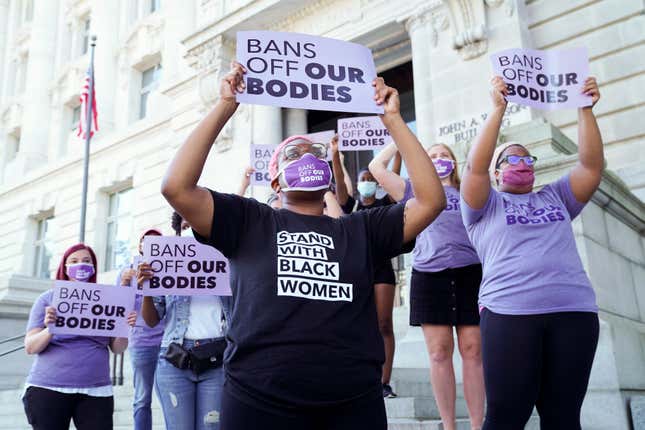Biden Needs to Do More Than Just Rescind Trump-Era Policies on Abortion and Trans Health
The time for urgent action on these issues was decades ago. Now, "pro-choice" politicians are just playing a terrifying game of catch-up—and they're losing.
Politics

Before the end of the month, the Biden administration will rescind a Trump-era Health and Human Services rule allowing health care workers to legally discriminate against trans people and people seeking abortion services. The policy, popularly called the “conscience” rule, allowed medical workers to refuse to perform gender-affirming health care, and not just refuse to perform abortions, but also deny patients information about abortion care, altogether. (Abortion and gender-affirming care are notably both health care; anyone who takes issue with these services could simply follow their “conscience” and not become health care workers, but alas.)
This move by the Biden administration is a relief—and it would be an even bigger relief if the policy, proposed in 2018 and enacted in 2019, had ever been allowed to take effect. But it was blocked by federal courts after dozens of states and reproductive rights advocates sued, and was never implemented.
Thus, while the announcement this week by the Biden administration is an important gesture—particularly as the ideological makeup of the courts is constantly shifting based on who’s in the White House—it’s just that: a gesture. At a time when state-level attacks on abortion and trans health care are skyrocketing, Biden needs to do more than just rescind Trump era policies in order to actually, meaningfully protect pregnant and trans people’s human rights. The administration needs to start playing offense.
Texans have effectively been living without the right to abortion for eight months now under the terror of SB8, a law that deputizes citizens to surveil each other, and threatens abortion clinics with lawsuits costly enough to shut them down. Mutations of SB8 have since spread to dozens of state legislatures, recently being signed into law in Idaho, and on the verge of being passed in Oklahoma—a state neighboring Texas that’s absorbed thousands of Texans seeking abortion since last year. The situation around abortion access has become so grave that 15-week bans, which have recently been signed into law in Florida, Arizona, and Kentucky, are now being marketed by anti-abortion politicians as “generous,” as if these laws—like the one in Texas—aren’t also forcing people to be pregnant and give birth against their will. Abortion bans notably carry the most impact for low-income people of color, who are more likely to lack the resources to travel to get care.
-

-

-

-

-

-

-

-

-

-

-

-

-

-

-

-

-

-

-

-

-

-

-

-

-

-

-

-

-

-

-

-

-

-

-

-

-

-

-

-









































